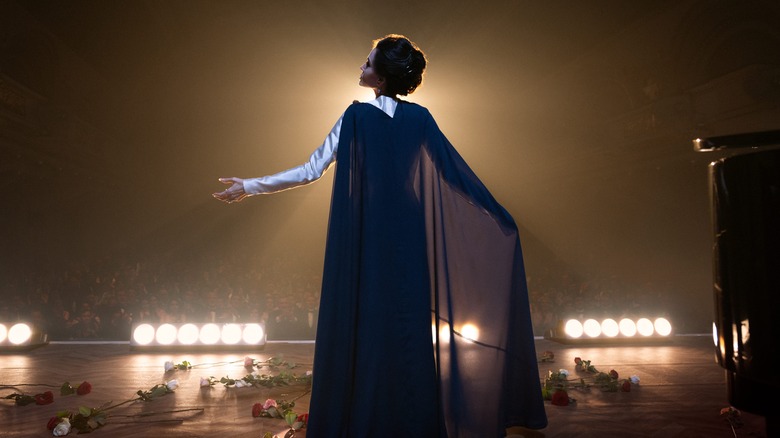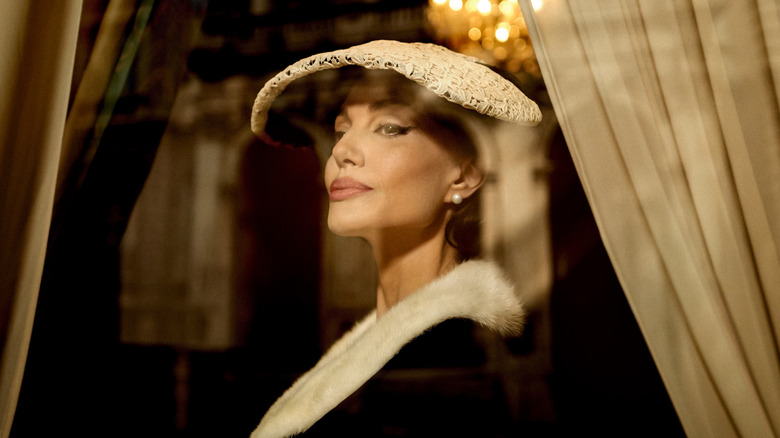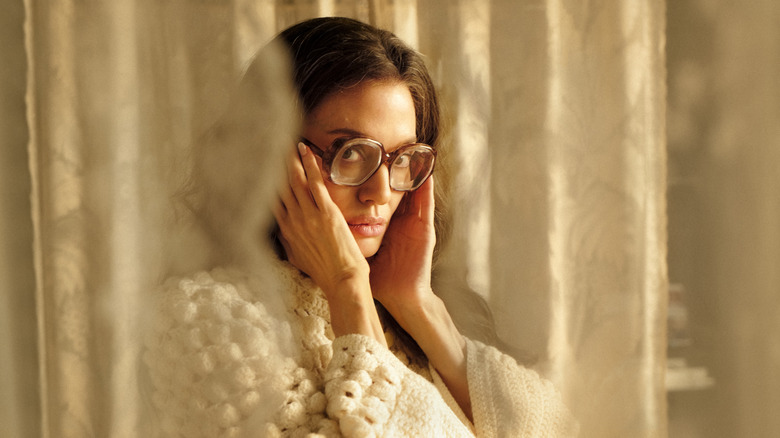Maria Review: Angelina Jolie Evokes Classic Hollywood In This Melancholy Biopic [Venice 2024]
- Angelina Jolie puts in a career-best performance
- Moving story and gorgeous cinematography
- Over-reliance on flashbacks
With "Maria," director Pablo Larraín continues his streak of telling stories about troubled, emotionally vulnerable women in the spotlight, picking up the thread that he established with "Jackie" and "Spencer." He finds success again with this melancholy drama starring Angelina Jolie as the reclusive, mentally ill opera singer Maria Callas in the days leading up to her untimely death in 1977. The film as a whole may be too sedate and ploddingly paced for some — a piano being moved back and forth, over and over again, across an elegant but lonely Parisian apartment, both literally and figuratively. But it's impossible to deny the raw emotional power of Jolie in the lead role.
"Maria" begins with its star's death. It's presented as an inevitability, from her imagined interviews with a production crew making a film entitled "Maria Callas: The Last Days" to her doctor's ominous warnings about her health. So from the very first moments, we know her fate — and the main characters seem to as well. As Maria becomes more and more dependent on certain drugs and reluctant to take the ones that might actually help, her butler Ferruccio (Pierfrancesco Favino) and housemaid Bruna (Alba Rohrwacher) — her only companions — can only look on and worry. She talks of writing an autobiography and seeing if she still has a singing voice, but anyone with eyes can see that she's winding down, and rather precipitously at that.
Angelia Jolie is at her very best
The greatest strength of "Maria" is that Pablo Larraín hired Angelina Jolie to play her. She's had plenty of high-profile roles that see her as a tough, imposing figure, but she's at her best when she's able to play vulnerable, mentally frail characters. As Maria, she uses her innate movie star charisma to channel the kind of old Hollywood starlet who even in quiet, relaxed interviews has the ability to make an audience hang on her every word. And what's more, she is capable of generating so much empathy from audiences, her beauty and grace fragile rather than intimidating. Her performance in "Maria" will probably go down as one of the best of the year, and for that matter, of her entire career.
Like in many of his other works, Larraín experiments in "Maria" with the line between reality and fantasy, or madness, if you like. Maria speaks confidently of a production crew coming to interview her, for example, although whether or not it actually exists is anyone's guess. The journalist (Kodi Smit-McPhee), it turns out, is called Mandrax — a manifestation of the sedative medication in the Quaalude family that Maria takes on a daily basis. But although he may not be real, he's certainly real enough to her, and his presence helps her work through some of the issues she'd been struggling with for decades. Her difficult childhood, her toxic relationship with Aristotle Onassis, and the birth and death of her singing career had been haunting her, and the conversational interview style she imagines herself to carry out with Mandrax finally gets everything off her chest. It's only through this removal of the distinction between what is real and what is not that she's able to unburden herself and be at peace with meeting death.
Both Maria and the film are trapped in the past
"Maria" seems as though it wants to be one of those biopics that focuses its lens tightly on a specific moment in time, in this case the week leading up to Maria Callas' death. This is usually a winning strategy, but Pablo Larraín also can't help himself from digging into the past. The opening montage offers a glimpse of Maria's larger-than-life career, providing all the context we need to understand this Norma Desmond-like figure. But the film also decides to include several flashbacks to different points in her life, some more effective than others.
A few moments are effective — a young Maria being forced by her mother to sing for (and, it's implied, to sleep with) German soldiers for money in Nazi-occupied Athens is especially harrowing. But there are scenes, particularly with her long-time lover Aristotle Onassis (Haluk Bilginer), that don't add much to the film or our understanding of the character, and only serve to bloat the run time. We know that Larraín finds it hard to resist throwing in some Kennedy lore (Onassis famously went on to marry JFK's widow Jackie, who was already the subject of one of his films), but there are a lot of elements of Maria's story to balance and they occasionally become a little out of whack. "Maria" is at its most interesting when Angelia Jolie is allowed to flounce around her melancholy Parisian apartment, Miss Havisham style, giving imaginary interviews in a perfectly cultivated accent and bonding with her beloved servants, who can barely conceal their deep concern for her. The flashbacks don't add quite as much to the story — although it's hard to say no to a quick Jack Kennedy cameo.
On the surface, "Maria" is a gorgeous film. Larraín is able to capture the spirit of loneliness and emotional fragility of Maria, who spent the whole of her extraordinary life being defined by one thing — her voice — only to be left formless after losing it. "Maria" evokes a tremendous amount of empathy for its subject, largely thanks to Jolie's mannered but deeply moving performance. This is the kind of role that used to be specifically engineered for the old-school grand dames of Hollywood, and Jolie proves herself once again as a true movie star of the first rate.
"Maria" premiered at the Venice Film Festival on August 29, and will be released on Netflix at a future date.


